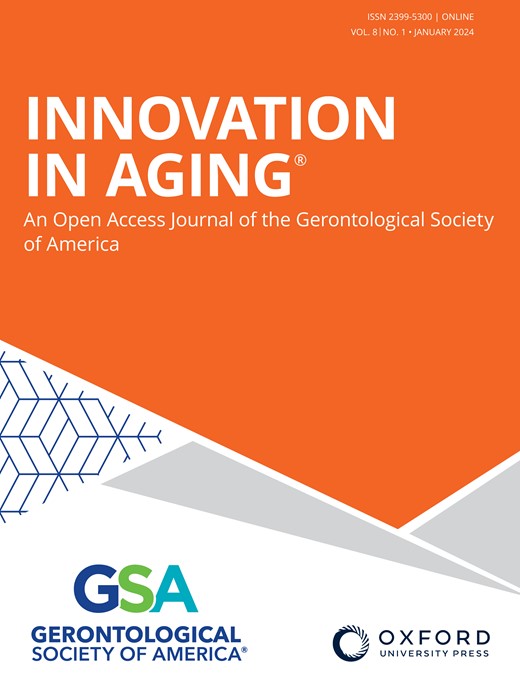Ageing and Caring: Exploring Older Adults’ Motivation for Informal Caregiving to Other Ageing Individuals in Nigeria
IF 4.9
3区 医学
Q1 GERIATRICS & GERONTOLOGY
引用次数: 0
Abstract
Because of the global population ageing, more informal carers become older adults. In Nigeria, the African country with the largest population of adults aged 60 years and older, self-construal rooted in the African collectivist philosophy generally shape informal caregiving for older adults. However, there is a general paucity of studies on older adults’ informal caregiving roles, particularly about their motivations for caregiving. This study explored older adults’ motives for informal caregiving to their care recipients in urban Southeast Nigeria. This study adopted a hermeneutic phenomenological research design. In-depth interviews were conducted with 30 purposively selected older adults aged 54-88 who were the primary carers of other older adults in the family and community. The collected data were analyzed using van Manen’s thematic analysis method, using QSR NVivo 12 software. Four main themes emerged from the participants' responses: reciprocity of kindness, altruism, a sense of moral responsibility, and eagerness for peaceful longevity. The findings generally showed that religion and culture were the latent factors ingrained in these motivations for informal caregiving. While the African philosophy emphasises altruism, reciprocity seems more prominent in specific traditional African communities, as observed in Southeast Nigeria. It serves as a means to prioritise family members’ needs. The findings indicate the need for the government to establish sustainable programs and policies that support older people in their caregiving role. Doing so will enable carers to derive psychosocial gains from informal caregiving and sustain the caregiving culture of Nigeria.老龄化与关爱:探索尼日利亚老年人对其他老龄人进行非正式照顾的动机
由于全球人口老龄化,越来越多的非正式照顾者成为老年人。尼日利亚是 60 岁及以上老年人口最多的非洲国家,根植于非洲集体主义哲学的自我建构普遍形成了对老年人的非正规照顾。然而,有关老年人非正式护理角色的研究,尤其是有关他们护理动机的研究,却普遍较少。本研究探讨了尼日利亚东南部城市中老年人非正式照顾受照顾者的动机。 本研究采用诠释学现象学研究设计。研究人员有针对性地选择了 30 名年龄在 54-88 岁之间的老年人进行了深入访谈,这些老年人是家庭和社区中其他老年人的主要照顾者。研究人员使用 QSR NVivo 12 软件,采用范曼恩主题分析法对收集到的数据进行了分析。 从参与者的回答中发现了四个主题:善意的互惠、利他主义、道德责任感和渴望和平长寿。研究结果普遍表明,宗教和文化是这些非正式护理动机中根深蒂固的潜在因素。 虽然非洲哲学强调利他主义,但在特定的传统非洲社区,互惠似乎更为突出,如在尼日利亚东南部观察到的情况。它是优先考虑家庭成员需求的一种手段。研究结果表明,政府有必要制定可持续的计划和政策,支持老年人发挥其照顾者的作用。这样做将使照顾者从非正式照顾中获得社会心理收益,并使尼日利亚的照顾文化得以延续。
本文章由计算机程序翻译,如有差异,请以英文原文为准。
求助全文
约1分钟内获得全文
求助全文
来源期刊

Innovation in Aging
GERIATRICS & GERONTOLOGY-
CiteScore
4.10
自引率
0.00%
发文量
72
审稿时长
15 weeks
期刊介绍:
Innovation in Aging, an interdisciplinary Open Access journal of the Gerontological Society of America (GSA), is dedicated to publishing innovative, conceptually robust, and methodologically rigorous research focused on aging and the life course. The journal aims to present studies with the potential to significantly enhance the health, functionality, and overall well-being of older adults by translating scientific insights into practical applications. Research published in the journal spans a variety of settings, including community, clinical, and laboratory contexts, with a clear emphasis on issues that are directly pertinent to aging and the dynamics of life over time. The content of the journal mirrors the diverse research interests of GSA members and encompasses a range of study types. These include the validation of new conceptual or theoretical models, assessments of factors impacting the health and well-being of older adults, evaluations of interventions and policies, the implementation of groundbreaking research methodologies, interdisciplinary research that adapts concepts and methods from other fields to aging studies, and the use of modeling and simulations to understand factors and processes influencing aging outcomes. The journal welcomes contributions from scholars across various disciplines, such as technology, engineering, architecture, economics, business, law, political science, public policy, education, public health, social and psychological sciences, biomedical and health sciences, and the humanities and arts, reflecting a holistic approach to advancing knowledge in gerontology.
 求助内容:
求助内容: 应助结果提醒方式:
应助结果提醒方式:


